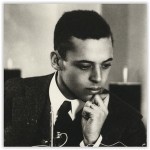(More Information On African Americans)
 Ernest Everett Just (August 14, 1883 – October 27, 1941) was a pioneering African-American biologist, academic and science writer. Just’s primary legacy is his recognition of the fundamental role of the cell surface in the development of organisms. In his work within marine biology, cytology and parthenogenesis, he advocated the study of whole cells under normal conditions, rather than simply breaking them apart in a laboratory setting. In addition, Just also left an everlasting impression within the African American community for his ability to pursue a high level of education in spite of the racial obstacles that he faced.
Ernest Everett Just (August 14, 1883 – October 27, 1941) was a pioneering African-American biologist, academic and science writer. Just’s primary legacy is his recognition of the fundamental role of the cell surface in the development of organisms. In his work within marine biology, cytology and parthenogenesis, he advocated the study of whole cells under normal conditions, rather than simply breaking them apart in a laboratory setting. In addition, Just also left an everlasting impression within the African American community for his ability to pursue a high level of education in spite of the racial obstacles that he faced.
At the outbreak of World War II, Ernest Just was working at the Station Biologique in Roscoff, France, researching the paper that would become Unsolved Problems of General Biology. Although the French government requested foreigners to evacuate the country, Just remained to complete his work. In 1940, Germany invaded France and Just was briefly imprisoned in a prisoner-of-war camp. He was rescued by the U.S. State Department and returned to his home country in September 1940. However, Just had been very ill for months prior to his arrest and his condition deteriorated in prison and on the journey back to the U.S. In the fall of 1941, he was diagnosed with pancreatic cancer, and died shortly thereafter.
Just was the subject of the 1983 biography Black Apollo of Science: The Life of Ernest Everett Just by Kenneth R. Manning. The book received the 1983 Pfizer Award and was a finalist for the 1984 Pulitzer Prize for Biography or Autobiography. Just has been featured in The Black Heritage Stamp series that began in 1978 honoring Afro-Americans great accomplishments. His stamp became available on February 1, 1996.In 1996, the U.S. Postal Service issued a commemorative stamp honoring Just.Beginning in 2000, the Medical University of South Carolina has hosted the annual Ernest E. Just Symposium to encourage non-white students to pursue careers in biomedical sciences and health professions.In 2002, scholar Molefi Kete Asante included Just on his list of the 100 Greatest African Americans.Just believed that “life as an event lies in a combination of chemical stuffs exhibiting physical properties; and it is in this combination, i.e., its behavior and activities, and in it alone that we can seek life.”
Click Here For More Information







